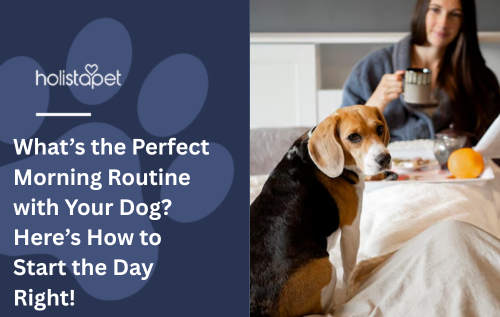Dogs thrive on routine — but are you giving them the structured day they crave? Whether you’re a first-time dog parent or a seasoned pup pro, understanding and implementing a solid dog routine can dramatically improve your dog’s behavior, health, and happiness.
In this post, we’ll break down the components of a successful dog routine, why it matters, and how to build one that fits both your lifestyle and your furry friend’s needs.
 Why Is a Dog Routine Important?
Why Is a Dog Routine Important?
Just like children, dogs feel safer and more secure when they know what to expect. A routine helps them:
-
Reduce anxiety and behavioral issues
-
Improve sleep and digestion
-
Strengthen your bond with them
-
Stay mentally and physically engaged
Key Elements of a Healthy Dog Routine
🕗 Morning:
-
Potty break right after waking up
-
15–30 minute walk or playtime
-
Breakfast at the same time every day
🌞 Midday:
-
A quick bathroom break or walk
-
Mental stimulation (treat puzzle, training session)
-
Short nap time
🌇 Evening:
-
A longer walk or play session
-
Dinner served on schedule
-
Wind-down time with the family
🌙 Night:
-
Potty break before bed
-
Consistent bedtime for better sleep rhythms
Tip: Use consistent commands and feeding times to help reinforce predictability.
 Frequently Asked Questions
Frequently Asked Questions
❓ How strict should I be with my dog’s schedule?
A: While some flexibility is okay, consistency is key. Try to keep core events (like meals and walks) within the same 30–60 minute window daily.
❓ What if I work long hours?
A: Consider hiring a dog walker or enrolling your pup in doggy daycare to maintain mid-day activity and breaks.
❓ Can I change my dog’s routine if needed?
A: Yes, but do so gradually. Shift feeding or walk times in small increments to avoid stress or confusion.
❓ Is a routine helpful for rescue dogs or puppies?
A: Absolutely! A predictable schedule is one of the best ways to build trust and confidence in rescue dogs or young pups.
Final Thoughts
Creating a daily routine for your dog isn’t just a responsibility — it’s a gift. Dogs with predictable schedules are calmer, healthier, and more responsive. Plus, it simplifies your life too!
Start small. Pick one or two parts of your day to anchor with your dog — like a morning walk or nightly treat — and build from there.
🐾 Remember: A happy dog is a dog that knows what’s coming next.
💡 Helpful Notes:
-
Use smartphone reminders to stay on track with meals and walks.
-
Keep a simple log for a week to track how your dog responds to new routines.
-
Consider your dog’s breed, age, and energy level when planning activities.
Let your dog’s wagging tail be the signal: you're doing something right.


 CBD Oil for Dogs - Fast Acting
CBD Oil for Dogs - Fast Acting
 Chicken Flavored CBD Oil For Dogs - Easy Dose
Chicken Flavored CBD Oil For Dogs - Easy Dose
 Salmon Flavored CBD Oil For Dogs - Highly Rated
Salmon Flavored CBD Oil For Dogs - Highly Rated
 CBG Oil for Dogs and Cats - Loved by Thousands
CBG Oil for Dogs and Cats - Loved by Thousands





Leave a comment
This site is protected by hCaptcha and the hCaptcha Privacy Policy and Terms of Service apply.